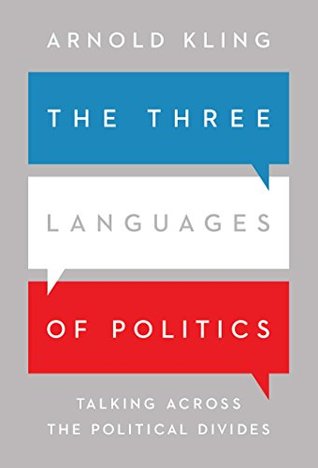More on this book
Community
Kindle Notes & Highlights
by
Arnold Kling
Read between
October 23 - October 27, 2018
In politics, I claim that progressives, conservatives, and libertarians are like tribes speaking different languages. The language that resonates with one tribe does not connect with the others. As a result, political discussions do not lead to agreement. Instead, most political commentary serves to increase polarization.
the three-axes model of political communication. A progressive will communicate along the oppressor-oppressed axis, framing issues in terms of the (P) dichotomy. A conservative will communicate along the civilization-barbarism axis, framing issues in terms of the (C) dichotomy. A libertarian will communicate along the liberty-coercion axis, framing issues in terms of the (L) dichotomy.
I encourage readers to adopt slow political thinking, which means seeing an issue from a number of angles rather than along just one axis. In
What learning the other languages can do is enable you to understand how others think about political issues. Instead of resorting to the theory that people with other views are crazy or stupid or evil, you may concede that they have a coherent point of view.
To me, these media personalities appear to be fighting a constant battle to keep their followers’ minds closed. The saddest part is that I believe they are succeeding. Political polarization has risen.10
What I am suggesting here is that we treat differing ideologies as if they were languages to be understood rather than heresies to be stamped out.
I do not think one’s goal should be to win everyone over to the same ideology. I think one’s goal for others should be that they have open minds. And if that is my goal for others, then it should also be the goal that I set for myself.
If people were open-minded, you would think that the more information they had, the more they would tend to come to agreement on issues. Surprisingly, political scientists and psychologists have found the opposite. More polarization exists among well-informed voters than among poorly informed voters. Moreover, when you give politically engaged voters on opposite sides an identical piece of new information, each side comes away believing more strongly in its original point of view. That phenomenon has been called “motivated reasoning.”
People need to affiliate with groups. Moreover, as we settled into larger groups than hunter-gatherer bands, we evolved a need to belong to groups that embody a higher moral purpose. For centuries, major religions met this need, but now the need is being met increasingly by political affiliation.
NFC [need for closure] refers to an aversion toward ambiguity and uncertainty, and the desire for a firm answer to a question. When NFC becomes overwhelming, any answer, even a wrong one, is preferable to remaining in a state of confusion and doubt. —Dylan Evans19
For example, in his 2012 book Libertarianism: What Everyone Needs to Know, Jason Brennan writes: American politics has two large camps. The first camp advocates an American police state—one that polices the world at large while policing its citizens’ lifestyles. It advocates having government promote traditional Judeo-Christian virtues. It wants to marginalize or expel alternative modes of life. The second camp advocates an American nanny state—one that tries to nudge and control the behavior of its citizens “for their own good.” Both camps support having the government manage, control, and
...more
Progressives believe in human betterment. They see nearly unlimited potential for humans to improve materially and, more important, morally.
Conservatives believe in human weakness. In biblical terms, man is “fallen.” The dark side of human nature will never be eradicated. It can be tamed only by social institutions, including the family, religion, and government. Take away those institutions, and what emerges is a situation similar to what is described in William Golding’s 1954 novel, Lord of the Flies.
Libertarians believe in human rationality. People pursue ends, and they act as t...
This highlight has been truncated due to consecutive passage length restrictions.
Progressives are inclined to revere science. They believe that science can help in the project of human betterment. They put social science on par with physical science, and they embrace social science as a guide to public policy. They believe ...
This highlight has been truncated due to consecutive passage length restrictions.
Conservatives are inclined to revere the past, including religious tradition. Conservatives tend to be less optimistic than progressives and libertarians about the future. Conservatives fear that civilization is or will s...
This highlight has been truncated due to consecutive passage length restrictions.
Libertarians are inclined to rever...
This highlight has been truncated due to consecutive passage length restrictions.
The only person you are qualified to pronounce unreasonable is yourself.


